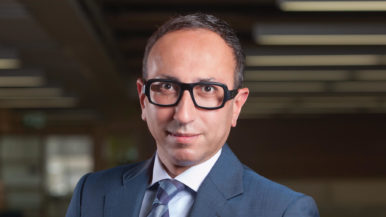The Twilight Zone
Today in Room 1241, things were more or less as we left them last time we met. In the morning, there was a guy in shackles and an orange jump suit facing Judge Amy St. Eve. It was a pre-trial hearing for a dope case, and both sides agreed the jury could hear evidence that the defendant told somebody in a recorded conversation that, “He got them guns.” (How the defence was going to spin this remained unclear.) All of which is to suggest that, in St. Eve’s courtroom, it’s same old, same old.
Yet into these environs, at 3:00 p.m. CST, arrived Conrad Black, now among 2007’s 60,000-odd newly-minted American felons, which is strange given that he is neither American nor, to his mind at least, a felon. His goal, and the Eddies’ task today, was to convince Judge St. Eve that he should be allowed to leave the jurisdictions of Northern Illinois and Palm Beach and return to Canada until his sentencing on November 30th. In order to accomplish this, the team had to a) reveal the extent of his assets and post however much more the court might deem necessary for bail, and b) prove that once in Canada, there was no chance whatsoever he would seek refuge by fighting his extradition should he fail to show up for sentencing. As the parties gathered in the courtroom, this seemed relatively straightforward. Either he did or didn’t have access to enough assets, and either they could or couldn’t convince the judge that he would show up for sentencing. And then something went terribly, surreally wrong.
For reasons best left to historians generations hence, Eddie Greenspan started repudiating a seemingly marginal affidavit submitted by Hollinger Inc., which laid out the company’s objections to posting any of what they consider to be their assets (assets Conrad Black thinks belong to him). This is where the proceedings left any world with which I am familiar and entered The Twilight Zone. The Hollinger Inc. affidavit in dispute was, in essence, a report written by somebody named Juval Aviv, who claimed that Conrad has, over the last several years, hidden some 60 million dollars by transferring funds between accounts in Luxembourg, Barbados and the Channel Islands, ultimately arriving in Gibraltar. According to Eddie, Juval makes these claims from his vantage as a self-styled counter-terrorism/white-collar-crime/money-laundering expert who, he pointed out rather lustily, says that everything written in George Jonas’s book Vengeance (yes, that George Jonas, and yes, the same book upon which Spielberg based his movie Munich, and yes, all of this found its way into Eddie’s presentation) is twaddle. Furthermore, said Eddie, Juval and Juval alone knows the true identity of the Lockerbie bomber and, surprise, surprise, it’s not who you think.
So exercised did Eddie become in disputing just about everything Aviv has ever said or done, that the entire hearing turned into a sort of performance art piece scripted by Ken Kesey and William Burroughs. He must have found a dozen ways of saying the same thing—“all falsification,” “mythology,” “damnable liar,” “double-dealing con artist”—about this mysterious nemesis. Several times, the government looked on the verge of cracking up at Eddie’s antics, which at one point included waving around what looked to be listings for all the bank accounts in all the banks in the Channel Islands (okay, I’m exaggerating, but you catch my drift).
In the end, on this issue alone, Eddie took well over half the two or so allotted hours, to—it must be said—little or no avail. The government’s response was basically, “Whatever. We still think your original rulings make sense and nothing said today changes that.” To which St. Eve, while leaving the door open a crack for further motions, agreed, and everyone was sent home. All, that is, save Lord Black of Crossharbour who, as Eddie pointed out in his final pleadings, “just wants to go home”—a prospect which must seem more and more remote with each passing day. As he drifted by the assembled and much dwindled press corps, Black turned to the guy from Bloomberg before entering the elevator and said, somewhat wistfully I thought, “Have a nice summer, Andy.”





